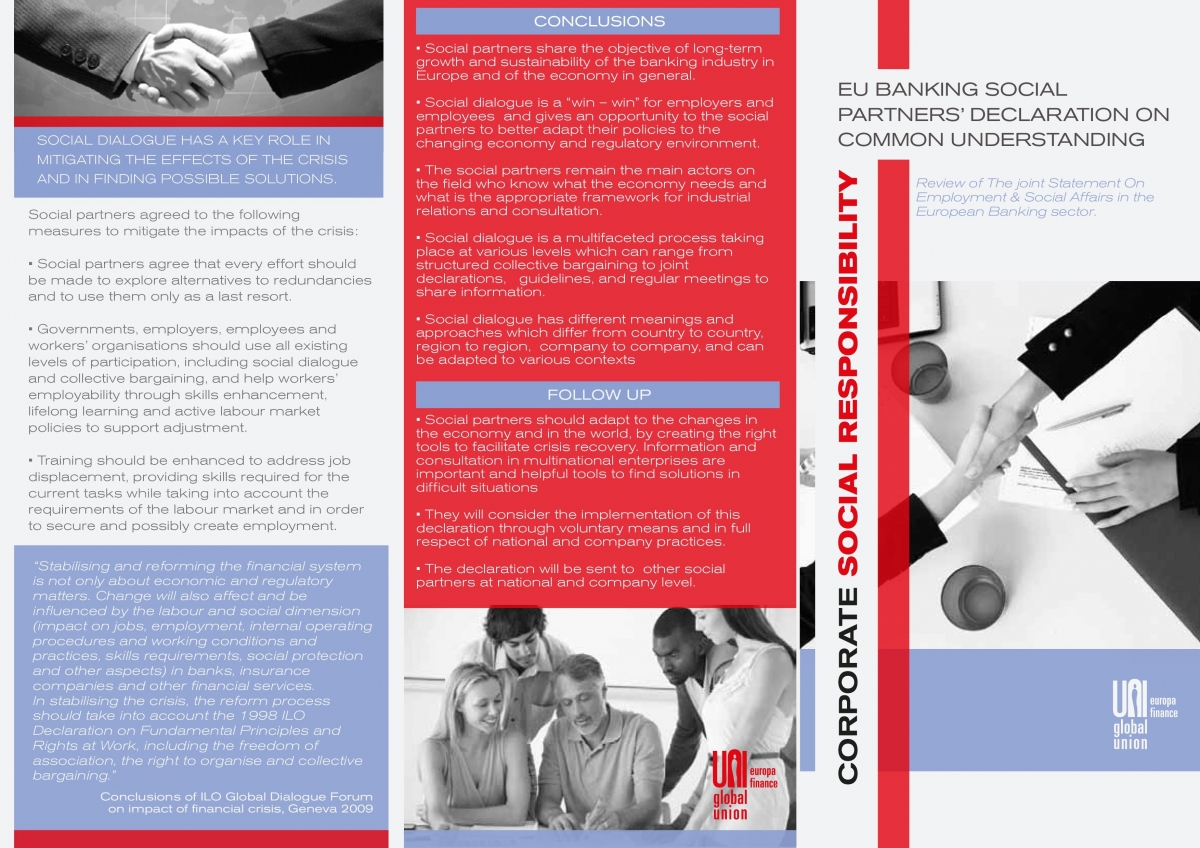Finance
Our work with multinational companies
UNI Finance is working with banks and insurance companies to improve working conditions and social dialogue by negotiating global agreements. UNI Finance is in contact with companies such as Barclays, ANZ, HSBC, Santander, Uni Credit, and Allianz. UNI Finance activities on multinational companies are organised in a decentralised way and are conducted in cooperation between trade union alliances, regional and global works council networks, the UNI Finance Steering Groups and the Secretariat.
Collective bargaining
UNI Finance facilitates joint action among trade unions across borders and negotiate transnational company agreements between senior management and employees.
European Works Councils
An important part of the work with multinational companies is setting up and strengthening European Works Councils (EWC). European legislation has enabled the negotiation of a large number of Europan works council (EWC) agreements. Currently, more than 60 agreements have been concluded in the finance sector.
At the EU level, the UNI Finance Working Group on multinational companies and EWCs is being lead by Dominic Hook.
Corporate Social Responsibility
UNI Finance works with its partners for the full implementation of CSR instruments, including the UN Global Compact, the International Finance Corporation’s Performance Standards on Social and Environmental sustainability, the OECD Guidelines for Multinational Enterprises and the Global Reporting Initiative’s financial sector supplement. In addition to these, UNI Finance believes that global framework agreements (GFAs) constitute the most comprehensive way for a company to achieve sound employment relations across countries.
Actions undertaken in the field of CSR include:
- UNI Finance Survey on multinational finance companies’ commitment to Principle 3 (freedom of association and right to collective bargaining) of the UN Global Compact
- Strategic partnership with the social rating agency Vigeo
- Establishment of a monitoring process for financial institutions receiving loans from the International Finance Corporation with the purpose of stopping the disbursement of loans to companies that do not abide by core labour standards
- At European level, UNI-Europa Finance works with European employers’ associations in the banking sector focusing on the labour dimension of CSR.

Key links
A Users' Guide For Trade Unionists to the OECD Guidelines for Multinational Enterprises (by TUAC)
OECD Guidelines for Multinational Enterprises website
Vigeo website
International Finance Corporation
The International Finance Corporation (IFC) is known as the “private sector arm” of the World Bank. It provides loans directly to the private sector in developing countries, unlike the World Bank which lends to governments. The IFC requests that the companies to which it makes loans respect a set of eight social and environmental standards. One of these standards, Performance Standard 2, addresses labour and working conditions, including freedom of association, right to collective bargaining, non-discrimination and equal opportunity. IFC's Performance Standard 2 is a powerful tool that trade unions can use to challenge companies that are violating labour rights and/or to organise in companies that have not been organised yet.
Key links
Sales and Advice
Finance workers around the globe shared their stories in a bid to end outrageous sales practices in the world’s banking system. Since the global financial crisis regulators and media have focused on consumer role in a sales situation. But what about the employees put under high sales pressure with insufficient time to provide good advise?
In 2010, UNI Finance adopted the Model Charter on Responsible Sales of Financial Products which key companies are encouraged to adopt. The charter aims to ensure the best possible framework for providing advice and responsible sales of products to customers.
sales_and_advice_charter-fin-e.pdf
sales_and_advice_charter-fin-de.pdf
sales_and_advice_charter-fin-f.pdf
sales_and_advice_charter-fin-sp.pdf
Objectives of the charter
a) To ensure internal business culture and operating procedures conducive to responsible sales of products.
b) To ensure staff are empowered with a high level of professional competence and have a good work environment.
c) To ensure financial products are of a high quality, suitable for the customer and are sold in a transparent manner.
d) To ensure a continuous dialogue on sales and advice issues between the company, its employees and the trade union representing them as well as other stakeholders.
Equal opportunities
UNI Finance is working closely with UNI's Equal Opportunities department to ensure gender balance and promote equal opportunities throughout its campaigns on multinational companies and its own operations.

